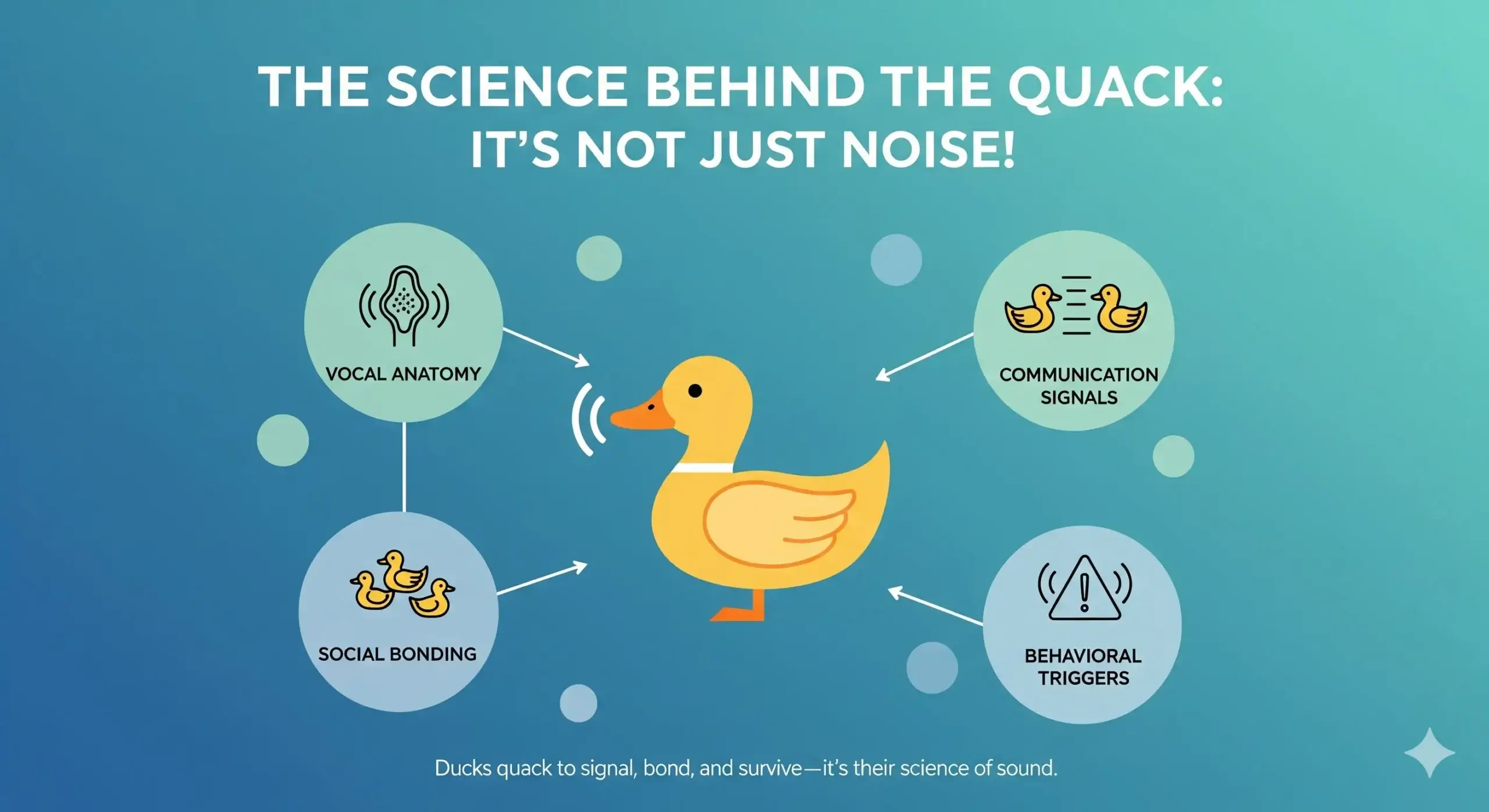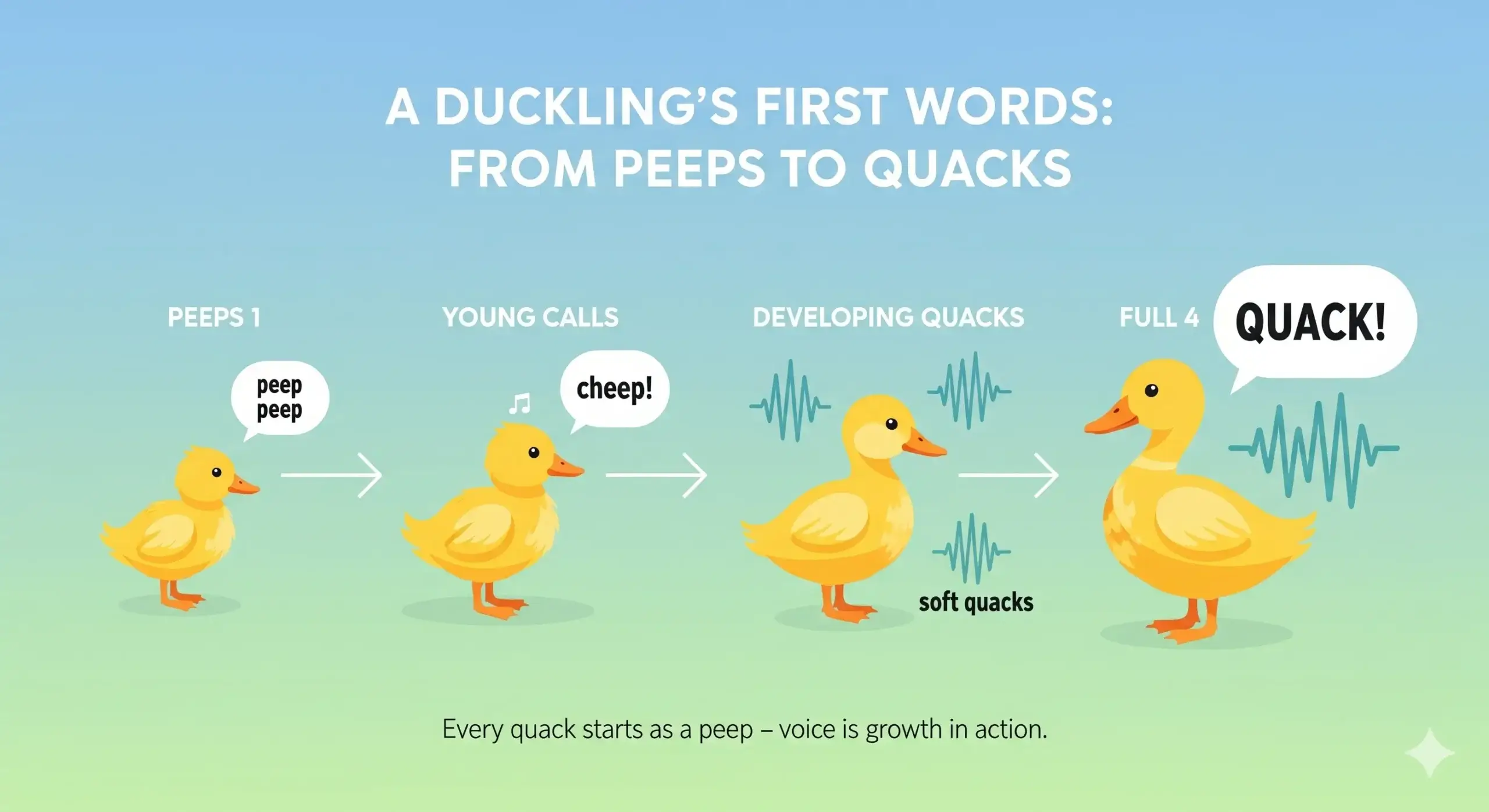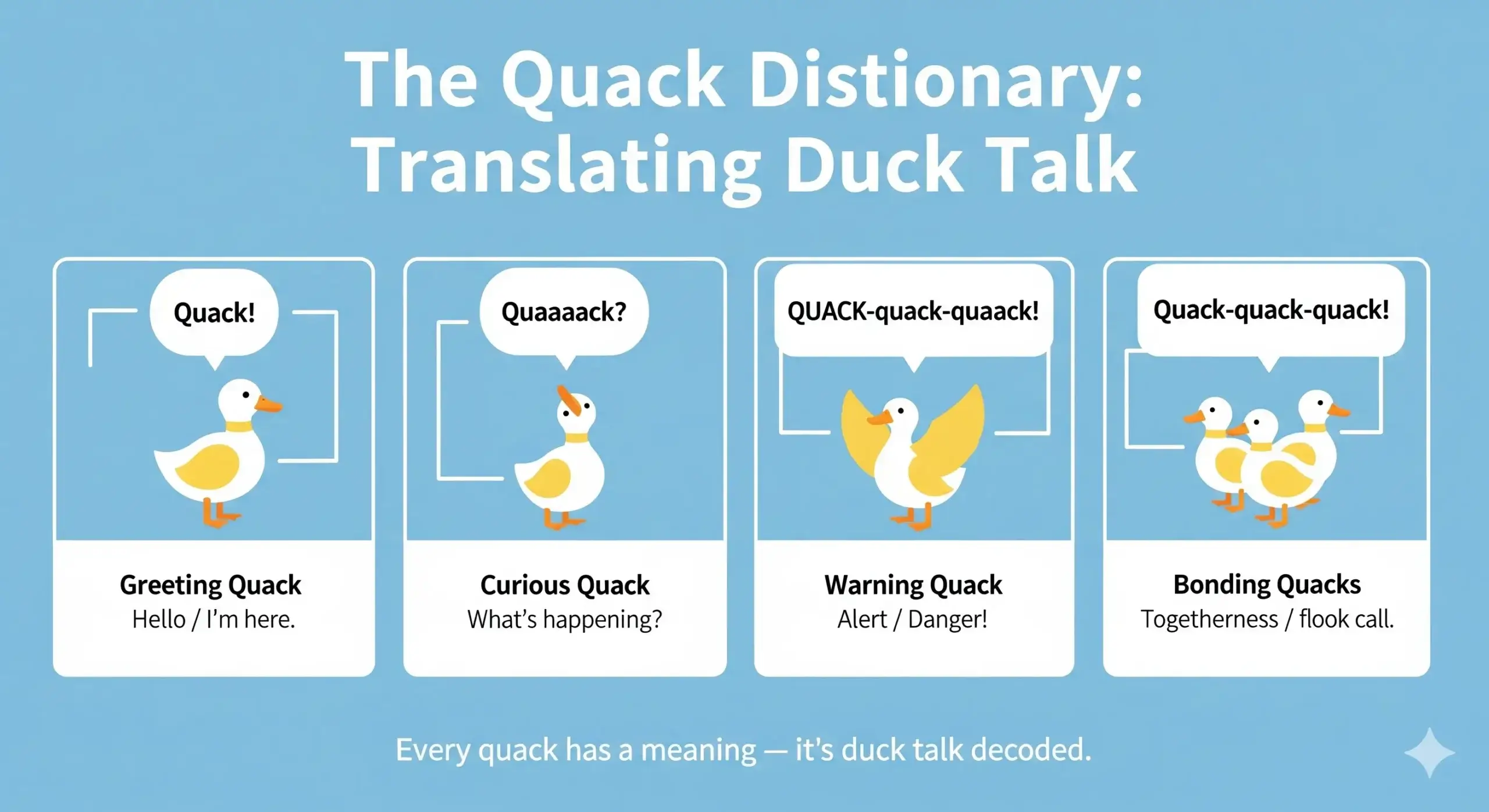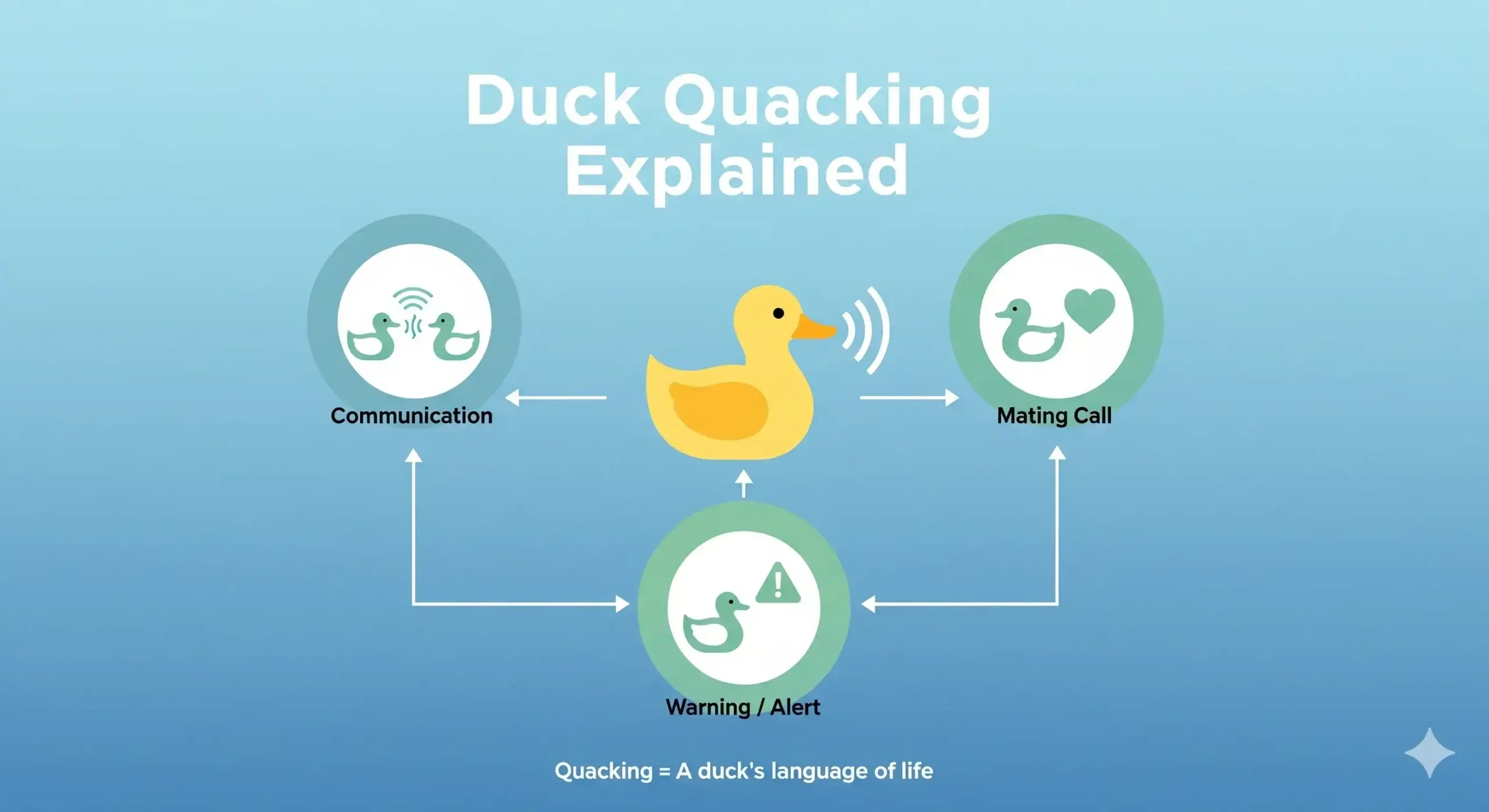I’ve spent more hours than I can count sitting by a pond, just listening. For me, the distinctive and iconic quack of a duck is more than just background noise; it’s a complex language. Understanding this communication has been a passion of mine for over two decades, and I’m here to share what I’ve learned about why ducks quack.
This isn’t just random noise. Duck quacking is a sophisticated system used to express emotions, maintain social bonds, and ensure survival. By the end of this, you’ll understand the purpose behind every quack and gain a new appreciation for these remarkable creatures.
Let’s decode their language together.
The Science Behind the Quack: It’s Not Just Noise!

Before we can translate, we need to understand the biology behind the sound. A duck’s vocalizations are a marvel of nature.
A Look Inside a Duck’s “Voice Box” – The Syrinx
Unlike us, birds have a special vocal organ called the syrinx. It’s located at the base of their trachea (or windpipe), where it splits to go to the lungs.
This organ has two separate chambers that can produce sounds independently. As airflow passes through, membranes and cartilaginous rings vibrate to create the initial sound. The muscles and connective tissue around the syrinx allow for incredible diversity in their calls.
Why Beaks and Throats Matter
The shape and size of the syrinx, along with their beaks and throats, help amplify the sound. This is how they control the pitch, volume, and resonance of their calls. It’s what makes a quack so loud, pronounced, and powerful, allowing it to travel long distances.
Is it a He or a She? Decoding Drake and Hen Calls
One of the first things I learned is that not all quacks are created equal. In fact, the classic quack you probably imagine is almost exclusively female.
The Classic “Quack”: A Mostly Female Affair
The loud, frequent quack is the signature call of the female duck, or hen. Her syrinx structure is larger, allowing her to produce varied and recognizable bird calls. She uses this vocal tool to communicate with her flockmates and ducklings.
What About the Boys? The Quiet Voice of Drakes
Male ducks, or drakes, are much quieter. Their voices are often a softer, raspy, deep, gravelly grumble or even whistles. They use these subdued sounds and grunts for things like courtship rituals to attract mates.
A Duckling’s First Words: From Peeps to Quacks

Watching a mother duck with her babies is a lesson in communication. It’s a heartwarming interaction.
The Sound of a Baby Duck
Ducklings don’t quack right away. They make soft, high-pitched, and delicate peeps and chirps. These aren’t just cute sounds; they signal important messages. A series of rapid peeps can mean they are hungry or need attention.
Growing into Their Voice
As they grow, their vocalizations become more distinct. This early chat is crucial for forming a strong bond with their mother, who provides guidance and reassurance. She teaches them to freeze or hide when she senses danger.
The Quack Dictionary: Translating Duck Talk

Ducks are incredibly talkative creatures, using a wide repertoire of sounds to convey all sorts of messages in different situations.
- The “All is Well” Chat: This is a soft, repetitive quack you’ll hear when ducks are relaxed. It’s their way of socializing while foraging for aquatic plants, grooming, or lounging in harmony. This creates flock cohesion.
- The “Treats are Here!” Quack of Excitement: If you’ve ever fed ducks, you know this one. It’s a frantic, high-energy burst of quacking during a feeding frenzy. This excitement can spread through the flock in a ripple effect.
- The “I Laid an Egg!” Announcement: After egg laying, a hen will often let out a rhythmic series of quacks. She is announcing her accomplishment to her flockmates.
- The “Yum, a Bug!” Murmur: While eating, you might hear subdued, content quacks as they find tasty insects or seeds.
Alarm Bells! Quacking for Survival
A duck’s environment is full of predators, so alarm calls are essential for survival and group coordination.
The “Danger! Predator!” Alarm Call
If a duck spots a threat, like a hawk or a fox, it will unleash a frantic, sharp, intense, and rapid quack. This high-pitched warning call alerts the entire flock, telling them to seek safety. It is one of the most critical vocalizations for group survival.
The Cornered Hiss and Growl
A duck that is afraid or cornered will abandon the quack altogether. Instead, it may hiss or growl in distress and fear as a last-ditch effort to defend itself from threats.
Love is in the Air: Quacks of Courtship and Mating
The breeding season brings a whole new set of vocalizations and rituals. Courtship is a complex dance of sounds and displays.
Wooing a Partner with Subtle Sounds
Drakes use subtle calls, whistles, and grunts during courtship displays to attract hens. These signals build trust and show their willingness to form bonds. The pitch and frequency of these calls can indicate their suitability as partners.
More Than Just Quacks: Physical Displays
This multi-sensory process involves physical actions, too. You’ll see head bobbing, tail wags, wing flaps, and synchronized movements. They puffing out their chest and show off their feathers to prove their strength and win over mates.
Flock Politics: Establishing the Pecking Order
Ducks have complex social structures and live in a hierarchical flock. Quacking is key to navigating this social ladder.
Quacking for Dominance and Territory
Ducks are territorial, especially over resources like food and nesting sites. Louder quacks are often used to assert dominance and authority in disputes.
The Sound of an Angry Duck
Angry quacks are aggressive and used to challenge rivals and maintain control. This intimidation is often paired with pecking to protect their space, especially when brooding or incubating eggs in their nests from intruders.
Do Duck Quacks Echo? Busting a Classic Myth
You might have heard the old myth that a duck’s quack doesn’t echo. I’m here to tell you it’s simply not true!
The sound waves from a quack behave just like any other sound. The issue is one of perception. A quack often fades, and its vibrations experience dissipation, making the reflections hard to hear, especially in open environments with lots of vegetation. Scientific experiments in acoustics have proven that quacks do, in fact, echo.
The Grand Tapestry of Nature
From happy chirps to an alarm call, duck quacking explained is really a story about communication for survival and social bonding. It’s a versatile and unique language that allows these feathered friends to interact with their environment and each other.
The next time you’re near wetlands, lakes, or rivers, I hope you’ll listen a little closer. That quack isn’t just a sound; it’s a vital part of the animal kingdom and a testament to how these creatures thrive.
Frequently Asked Questions (FAQ)
Why do female ducks quack more than males?
Female ducks (hens) typically have a larger, more varied vocal organ (syrinx) than drakes (males), allowing them to produce the loud, classic quack we recognize. Males often make softer grunts or whistles.
What do different duck quacks mean?
Ducks use their vocalizations for various purposes: contact calls for flock cohesion (subdued quacks), alarm calls for danger (rapid, high-pitched quacks), courtship displays (whistles, grunts, softer calls), and excitement (frantic quacking for treats!).
Do ducks quack when they are happy?
Absolutely! Happy chirps or content quacks are common when ducks are feeling good, especially during foraging, socializing, or when they see their caretakers bringing treats.
Can ducks recognize their human caretakers by their voices?
Yes, ducks are quite intelligent! They can form social bonds with humans and often learn to recognize their caretakers by their voice, appearance, and even specific routines, responding with greeting quacks.
Is it true that a duck’s quack doesn’t echo?
No, that’s a common myth! A duck’s quack does echo, just like any other sound. The perception that it doesn’t is due to the sound’s frequency and rapid dissipation in open environments.
How do ducks communicate danger to their ducklings?
A mother duck will use urgent, rapid, and often high-pitched warning calls to signal danger to her babies. She might also use cooing sounds for reassurance and to encourage them to freeze or hide for safety and guidance when navigating their natural habitat.
Why is my duck quacking so much?
Excessive quacking in domestic ducks can be for many reasons. Whether confined or free-ranging, they might be experiencing stress, anxiety, or insecurity. They could be lonely and want your attention, or they may just be a talkative breed. Monitoring their vocalization is a good way to check on their health.
Do different duck breeds sound different?
Absolutely! There is incredible diversity among species. Pekins and Blue Swedish ducks are known to be loud and vocal, while Muscovy ducks are much quieter, with a reserved demeanor, and often hiss more than they quack. Mallard ducks have that classic quack, while Wood ducks have more of a soft whistle for close-range communication.
How do mother ducks talk to their babies?
A mother uses soothing, motherly cooing sounds for reassurance and to guide her ducklings. She uses a different tone with more urgency to warn of danger, teaching them how to Maps the world safely. This parental care is amazing to watch.
Can you understand an individual duck’s personality through its quack?
I believe so. After years of observation, I can identify individual ducks by their unique tone. Some have more reserved personalities and a quieter temperament, while others are natural leaders. Their quacks, combined with their body language, give you great insight into who they are.
Sources and References:
- https://www.birds.cornell.edu/crows/all-about-birds-faq-and-search/
- https://www.audubon.org/birds
- https://www.ducks.org/
- https://www.sciencedirect.com/journal/animal-behaviour
- https://www.rspb.org.uk/birds-and-wildlife/wildlife-guides/bird-a-z/
- https://www.nationalgeographic.com/animals/birds
Hello! I’m Ibrahim, the owner and writer of this blog. I run a chicken farm with 160 chickens, and I’ve gained a lot of knowledge about raising and caring for them. Now, I want to share my insights and experiences with you to help you in chicken keeping.

